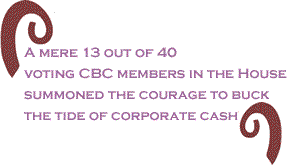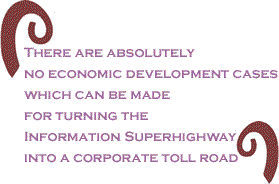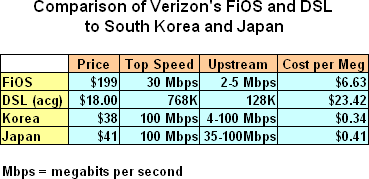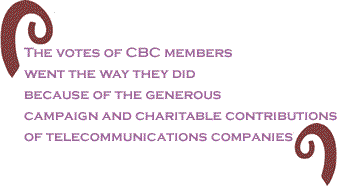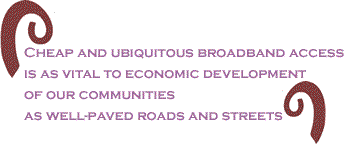
|
|||||||||||||||||||||
 |
|||||||||||||||||||||
 |
|||||||||||||||||||||
 |
|||||||||||||||||||||
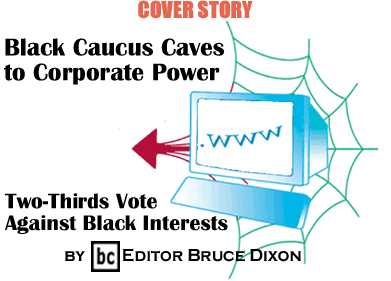 |
|
|
The independence of black American leadership is under assault by a tsunami of cash. Unprecedented levels of corporate underwriting are subverting black civic organizations. Tens of millions in faith-based federal grants have been deployed to suborn black clergy. Rivers of charitable and campaign contributions have been invested in subduing or silencing the voices of African America elected officials. Predictably, the onslaught is taking its toll. Last week the House of Representatives passed the COPE Act, which will turn the free and open Information Superhighway into a corporate toll road, and lift regulations that force cable and telephone companies to serve poor and minority areas. Only 46% of Democrats in the House of Representatives voted against it. But in a stunning repudiation of its own historic claims to be the “conscience of the congress” and the authentic voice of African America in national affairs, a mere 13 out of 40 voting CBC members in the House summoned the courage to buck the tide of corporate cash and stand up for their constituents. (The two delegates from Washington, DC and the U.S. Virgin Islands cannot vote on the House floor.) Two-thirds of the Caucus capitulated to corporate power, a more shameful showing than Democratic members as a whole. As “conscience of the congress,” the Congressional Black Caucus is pretty much over. To comprehend the depths of this betrayal we must understand that there are absolutely no economic development cases which can be made with a straight face for turning the free Internet into a corporate toll road, or for allowing cable and phone companies to deny premium broadband service to all but the wealthiest customers.
The dirty little secret the telecommunications companies will never tell us is that despite the incessant prattle about being the most technologically advanced nation on the planet, the US ranks 16th, according to the International Telecommunications Union, in the percentage of its citizens provided with some form of broadband Internet access. When we can get that access at all, broadband Internet in the US is the slowest and most expensive in the developed world, well behind Japan, South Korea, and all of Western Europe. Bruce Kushnick of www.teletruth.org offers this useful comparison between proposed broadband services in the US and those in South Korea and Japan.
The top broadband speed available to home and business consumers in the US is only 1.5 megabits per second, and most customers pay about $30 per month for that. In France customers get 25 megabits per second for less than a third the price. Singapore is about to offer its citizens 1000 megabits per second. American telcos, on the other hand, say they cannot give us more than 6 megabits per second without the end of network neutrality as a financial incentive. The claims of cable and telecommunications monopolies that deregulating them and handing the keys of the Internet over to them will erase the digital divide inside the US, provide universal access and keep us competitive with the rest of the world, are simply lies. US consumers have already paid AT&T, Comcast, Verizon, BellSouth, Qwest and the rest of their telecom and cable cousins hundreds of billions in corporate tax breaks and excess fees – the highest phone, cable and Internet charges in the world – to provide universal high-speed access which we have never received.
Other provisions of the COPE Act favored by 27 out
of 40 members of the Congressional Black Caucus which allow These are the 13 voting members of the Congressional Black Caucus in the House who should he applauded for upholding its tradition, the interests of African American communities, and the interests of the whole American public. Barbara Lee -- CA Diane E. Watson -- CA Maxine Waters -- CA Juanita Millender-McDonald -- CA Cynthia McKinney -- GA John Lewis -- GA Carolyn Kilpatrick -- MI John Conyers, Jr. -- MI Emanuel Cleaver, II -- MO Donald M. Payne -- NJ Chaka Fattah -- PA Robert Scott -- VA Gwen Moore -- WI And these are the twenty-seven who caved to corporate cash, voting to end the Internet as we know it. They voted to allow phone and Internet companies to raise long distance charges, and to exempt cable companies from the oversight of local governments who might prohibit discrimination against their constituents. Artur Davis -- AL Corrine Brown -- FL Kendrick B. Meek -- FL Alcee L. Hastings -- FL Sanford Bishop, Jr. -- GA David Scott -- GA Bobby L. Rush -- IL Jesse Jackson, Jr. -- IL Danny Davis -- IL Julia Carson -- IN William J. Jefferson -- LA Albert Wynn -- MD Elijah E. Cummings -- MD William Lacy Clay, Jr. -- MO Bennie G. Thompson -- MS G. K. Butterfield, Jr. -- NC Melvin L. Watt -- NC Gregory W. Meeks -- NY Edolphus Towns -- NY Major R. Owens -- NY Charles B. Rangel -- NY Stephanie T. Jones -- OH James E. Clyburn -- SC Harold E. Ford, Jr. -- TN Al Green -- TX Sheila Jackson-Lee -- TX Eddie Bernice Johnson -- TX It’s Later Than You Think From a legal and regulatory standpoint the free and open Internet as we know it has been on borrowed time for many months. A 6 to 3 Supreme court decision led by Clarence Thomas back in June of 2005 split an imaginary legal hair to exempt cable companies from the “common carrier” rule that compels the owners of phone networks to route traffic from outside their own networks on a non-discriminatory basis. That was the first regulatory nail in the coffin of network neutrality. Phone companies, who provide most of the broadband Internet to homes and businesses in the US immediately appealed for the FCC to extend the ruling to them, and they did, with a 12 month moratorium before the new ruling takes effect. So even if the Senate version of the COPE Act dies, and the congress does nothing this year, telecommunications monopolies will be free to end network neutrality beginning some time in August.
The COPE Act and its Senate version merely makes the existing situation even worse, by explicitly forbidding the FCC from enforcing anything resembling network neutrality. But even without it, the telecommunications companies have already bought the court decisions and regulations they want. Without network neutrality, those of us who enjoy cheap long distance phone calling over the Internet will see our Internet providers block or ban services other than theirs, and raise the prices. Many of us who imagine we don’t even use the Internet, but who depend on long distance calling cards to stay in touch with relatives or friends will find those services more expensive or unavailable. And those who download music, who read foreign newspapers, who share pictures and news and opinions are about to experience a new Internet regime. It’s not too late to fight it, or to roll it back, but it is coming. It’s later than we think. The free and open Internet is almost over. And as far as representing the interests and aspirations of black America, so is the Congressional Black Caucus. We recommend you visit SaveAccess.org for the complete list of Democrats who voted for and against the COPE Act. If your congressperson voted against it, it’s time to call and congratulate him or her. If he or she voted for it, and most did, call and express your profound disappointment. It’s time for citizens, consumers and communities in the US to fight for the kind of universal broadband access people in Western Europe and Japan enjoy. Cheap and ubiquitous broadband access is as vital to economic development of our communities as are well-paved roads and streets. And if corporate cash can flip a majority of its members on such a key issue, it may also be time for African Americans to take a long look at the usefulness of the Congressional Black Caucus. |
|
| Home | |
Your comments are always welcome. Visit the Contact Us page to send e-Mail or Feedback or Click here to send e-Mail to [email protected] e-Mail re-print notice
If you send us an e-Mail message we may publish all or part of it, unless you tell us it is not for publication. You may also request that we withhold your name. Thank you very much for your readership. |
|
| June 15, 2006 Issue 188 |
||||||||||||||
|
||||||||||||||
|
||||||||||||||
| Printer Friendly Version in resizeable plain text format | ||||||||||||||
 |
||||||||||||||
 |
||||||||||||||
 |
||||||||||||||
 |
||||||||||||||
| |
||||||||||||||
| |
||||||||||||||





















